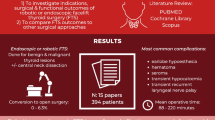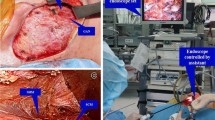Abstract
Background
The most important advantage of remote-access robotic and endoscopic thyroidectomies is believed to be the excellent postoperative cosmesis. The purpose of this study was to compare directly the postoperative cosmetic outcomes of robotic/endoscopic thyroidectomy via gasless transaxillary and postauricular facelift approaches with those of conventional thyroidectomy.
Methods
We prospectively studied 100 patients who underwent robotic/endoscopic thyroidectomy using a gasless unilateral axillary (GUA) approach (50 patients) or a postauricular facelift approach (50 patients), and 50 who underwent conventional transcervical thyroidectomy. Postoperative cosmetic satisfaction scores and scar consciousness scores were evaluated at 3 months and 1 year after surgery using questionnaires developed by us. Vancouver scar scales were evaluated at the same time. The cosmetic satisfaction score was defined as the sum of the two cosmetic satisfaction questions with a rating scale of 1–5 each. The scar consciousness score was defined as the sum of the four scar consciousness questions with a rating scale of 0–3 each.
Results
The cosmetic satisfaction and scar consciousness scores were significantly lower (corresponding to greater satisfaction) in the transaxillary and postauricular facelift groups than the conventional group at 3 months and 1 year postoperatively. They did not differ between the transaxillary and postauricular facelift groups. However, the Vancouver scar scale score of the conventional group was significantly lower than those of the transaxillary and postauricular facelift groups (P < 0.001 in both).
Conclusion
Robotic/endoscopic thyroidectomy via transaxillary or postauricular facelift approaches results in better cosmesis than the conventional approach. However, scar healing itself is worse in the transaxillary and facelift approaches than the conventional approach.



Similar content being viewed by others
References
Schlumberger MJ (1998) Papillary and follicular thyroid carcinoma. N Engl J Med 338:297–306
Song CM, Tae K (2016) Robotic thyroidectomy: evolution and outcomes. Hanyang Med Rev 36:205–210
Tae K, Ji YB, Song CM, Ryu J (2019) Robotic and endoscopic thyroid surgery: evolution and advances. Clin Exp Otorhinolaryngol 12(1):1–11
Kang SW, Lee SC, Lee SH, Lee KY, Jeong JJ, Lee YS, Nam KH, Chang HS, Chung WY, Park CS (2009) Robotic thyroid surgery using a gasless, transaxillary approach and the da Vinci S system: the operative outcomes of 338 consecutive patients. Surgery 146:1048–1055
Terris DJ, Singer MC, Seybt MW (2011) Robotic facelift thyroidectomy: II. Clinical feasibility and safety. Laryngoscope 121:1636–1641
Anuwong A (2016) Transoral endoscopic thyroidectomy vestibular approach: a series of the first 60 human cases. World J Surg 40(3):491–497
Tae K, Ji YB, Cho SH, Kim KR, Kim DW, Kim DS (2011) Initial experience with a gasless unilateral axillo-breast or axillary approach endoscopic thyroidectomy for papillary thyroid microcarcinoma: comparison with conventional open thyroidectomy. Surg Laparosc Endosc Percutaneous Tech 21:162–169
Tae K, Ji YB, Jeong JH, Lee SH, Jeong MA, Park CW (2011) Robotic thyroidectomy by a gasless unilateral axillo-breast or axillary approach: our early experiences. Surg Endosc 25:221–228
Tae K, Ji YB, Cho SH, Lee SH, Kim DS, Kim TW (2012) Early surgical outcomes of robotic thyroidectomy by a gasless unilateral axillo-breast or axillary approach for papillary thyroid carcinoma: 2 years’ experience. Head Neck 34:617–625
Sung ES, Ji YB, Song CM, Yun BR, Chung WS, Tae K (2016) Robotic thyroidectomy: comparison of a postauricular facelift approach with a gasless unilateral axillary approach. Otolaryngol Head Neck Surg 154:997–1004
Tae K, Song CM, Ji YB, Sung ES, Jeong JH, Kim DS (2016) Oncologic outcomes of robotic thyroidectomy: 5-year experience with propensity score matching. Surg Endosc 30:4785–4792
Tae K, Song CM, Ji YB, Kim KR, Kim JY, Choi YY (2014) Comparison of surgical completeness between robotic total thyroidectomy versus open thyroidectomy. Laryngoscope 124:1042–1047
Song CM, Ji YB, Bang HS, Park CW, Kim H, Tae K (2014) Long-term sensory disturbance and discomfort after robotic thyroidectomy. World J Surg 38:1743–1748
Song CM, Ji YB, Bang HS, Park CW, Kim DS, Tae K (2014) Quality of life after robotic thyroidectomy by a gasless unilateral axillary approach. Ann Surg Oncol 21:4188–4194
Ji YB, Song CM, Bang HS, Lee SH, Park YS, Tae K (2014) Long-term cosmetic outcomes after robotic/endoscopic thyroidectomy by a gasless unilateral axillo-breast or axillary approach. J Laparoendosc Adv Surg Tech A 24:248–253
Sullivan T, Smith J, Kermode J, McIver E, Courtemanche DJ (1990) Rating the burn scar. J Burn Care Rehabil 11:256–260
Draaijers LJ, Tempelman FR, Botman YA, Tuinebreijer WE, Middelkoop E, Kreis RW, van Zuijlen PP (2004) The patient and observer scar assessment scale: a reliable and feasible tool for scar evaluation. Plast Reconstr Surg 113:1960–1965
Lee J, Nah KY, Kim RM, Ahn YH, Soh EY, Chung WY (2010) Differences in postoperative outcomes, function, and cosmesis: open versus robotic thyroidectomy. Surg Endosc 24:3186–3194
Kandil EH, Noureldine SI, Yao L, Slakey DP (2012) Robotic transaxillary thyroidectomy: an examination of the first one hundred cases. J Am Coll Surg 214:558–564
Ikeda Y, Takami H, Sasaki Y, Takayama J, Niimi M, Kan S (2003) Clinical benefits in endoscopic thyroidectomy by the axillary approach. J Am Coll Surg 196:189–195
Lee DY, Lee KJ, Han WG, Oh KH, Cho JG, Baek SK, Kwon SY, Woo JS, Jung KY (2016) Comparison of transaxillary approach, retroauricular approach, and conventional open hemithyroidectomy: a prospective study at single institution. Surgery 159:524–531
Arora A, Garas G, Sharma S, Muthuswamy K, Budge J, Palazzo F, Darzi A, Tolley N (2016) Comparing transaxillary robotic thyroidectomy with conventional surgery in a UK population: a case control study. Int J Surg 27:110–117
Sasaki A, Nakajima J, Ikeda K, Otsuka K, Koeda K, Wakabayashi G (2008) Endoscopic thyroidectomy by the breast approach: a single institution’s 9-year experience. World J Surg 32:381–385
Toll EC, Loizou P, Davis CR, Porter GC, Pothier DD (2012) Scars and satisfaction: do smaller scars improve patient-reported outcome? Eur Arch Otorhinolaryngol 269:309–313
Son D, Harijan A (2014) Overview of surgical scar prevention and management. J Korean Med Sci 29:751–757
Materazzi G, Fregoli L, Manzini G, Baggiani A, Miccoli M, Miccoli P (2014) Cosmetic result and overall satisfaction after minimally invasive video-assisted thyroidectomy (MIVAT) versus robot-assisted transaxillary thyroidectomy (RATT): a prospective randomized study. World J Surg 38:1282–1288
Li J, Chen J, Kirsner R (2007) Pathophysiology of acute wound healing. Clin Dermatol 25:9–18
Janis JE, Harrison B (2016) Wound healing: part I. Basic science. Plast Reconstr Surg 138:9S–17S
Baum CL, Arpey CJ (2005) Normal cutaneous wound healing: clinical correlation with cellular and molecular events. Dermatol Surg 31:674–686
James AG, Pople JE, Parish WE, Moore AE, Dunbar N (2006) Histological evaluation of hyperpigmentation on female Filipino axillary skin. Int J Cosmet Sci 28:247–253
Kim SM, Chun KW, Chang HJ, Kim BW, Lee YS, Chang HS, Park CS (2015) Reducing neck incision length during thyroid surgery does not improve satisfaction in patients. Eur Arch Otorhinolaryngol 272:2433–2438
Linos D, Economopoulos KP, Kiriakopoulos A, Linos E, Petralias A (2013) Scar perceptions after thyroid and parathyroid surgery: comparison of minimal and conventional approaches. Surgery 153:400–407
Arora A, Swords C, Garas G, Chaidas K, Prichard A, Budge J, Davies DC, Tolley N (2016) The perception of scar cosmesis following thyroid and parathyroid surgery: a prospective cohort study. Int J Surg 25:38–43
Author information
Authors and Affiliations
Corresponding author
Ethics declarations
Disclosures
Dong Won Lee, Seok Hwa Ko, Chang Myeon Song, Yong Bae Ji, Jeong Kyu Kim, and Kyung Tae have no conflicts of interest or financial ties to disclose.
Additional information
Publisher's Note
Springer Nature remains neutral with regard to jurisdictional claims in published maps and institutional affiliations.
Rights and permissions
About this article
Cite this article
Lee, D.W., Ko, S.H., Song, C.M. et al. Comparison of postoperative cosmesis in transaxillary, postauricular facelift, and conventional transcervical thyroidectomy. Surg Endosc 34, 3388–3397 (2020). https://doi.org/10.1007/s00464-019-07113-1
Received:
Accepted:
Published:
Issue Date:
DOI: https://doi.org/10.1007/s00464-019-07113-1




